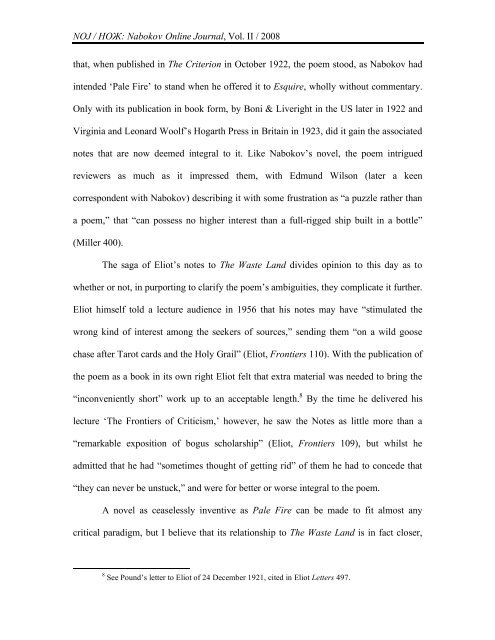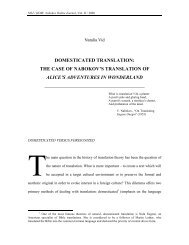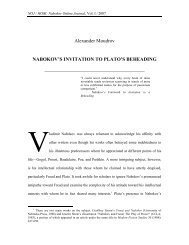musing upon the king's wreck - Electronic Text Centre
musing upon the king's wreck - Electronic Text Centre
musing upon the king's wreck - Electronic Text Centre
Create successful ePaper yourself
Turn your PDF publications into a flip-book with our unique Google optimized e-Paper software.
NOJ / НОЖ: Nabokov Online Journal, Vol. II / 2008<br />
that, when published in The Criterion in October 1922, <strong>the</strong> poem stood, as Nabokov had<br />
intended ‘Pale Fire’ to stand when he offered it to Esquire, wholly without commentary.<br />
Only with its publication in book form, by Boni & Liveright in <strong>the</strong> US later in 1922 and<br />
Virginia and Leonard Woolf’s Hogarth Press in Britain in 1923, did it gain <strong>the</strong> associated<br />
notes that are now deemed integral to it. Like Nabokov’s novel, <strong>the</strong> poem intrigued<br />
reviewers as much as it impressed <strong>the</strong>m, with Edmund Wilson (later a keen<br />
correspondent with Nabokov) describing it with some frustration as “a puzzle ra<strong>the</strong>r than<br />
a poem,” that “can possess no higher interest than a full-rigged ship built in a bottle”<br />
(Miller 400).<br />
The saga of Eliot’s notes to The Waste Land divides opinion to this day as to<br />
whe<strong>the</strong>r or not, in purporting to clarify <strong>the</strong> poem’s ambiguities, <strong>the</strong>y complicate it fur<strong>the</strong>r.<br />
Eliot himself told a lecture audience in 1956 that his notes may have “stimulated <strong>the</strong><br />
wrong kind of interest among <strong>the</strong> seekers of sources,” sending <strong>the</strong>m “on a wild goose<br />
chase after Tarot cards and <strong>the</strong> Holy Grail” (Eliot, Frontiers 110). With <strong>the</strong> publication of<br />
<strong>the</strong> poem as a book in its own right Eliot felt that extra material was needed to bring <strong>the</strong><br />
“inconveniently short” work up to an acceptable length. 8 By <strong>the</strong> time he delivered his<br />
lecture ‘The Frontiers of Criticism,’ however, he saw <strong>the</strong> Notes as little more than a<br />
“remarkable exposition of bogus scholarship” (Eliot, Frontiers 109), but whilst he<br />
admitted that he had “sometimes thought of getting rid” of <strong>the</strong>m he had to concede that<br />
“<strong>the</strong>y can never be unstuck,” and were for better or worse integral to <strong>the</strong> poem.<br />
A novel as ceaselessly inventive as Pale Fire can be made to fit almost any<br />
critical paradigm, but I believe that its relationship to The Waste Land is in fact closer,<br />
8 See Pound’s letter to Eliot of 24 December 1921, cited in Eliot Letters 497.
















